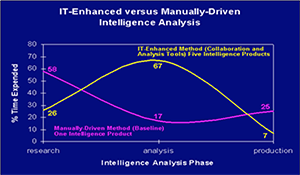Information Challenges in Federated Analysis


Overcoming Information Challenge in Federated Analysis: From Concepts to Practice.
Author | Editor: Canna, S. (NSI, Inc).
The Overcoming Information Challenge in Federated Analysis: from Concepts to Practice workshop, held on 27-28 August 2008, was convened in response to requests from US Special Operations Command and US Strategic Command, Lieutenant General Carter F. Ham, Director of Operations, J-3, Joint Staff. The workshop is part of an effort to develop national-level capability to identify and anticipate the action of Violent Non-State Actors (VNSA) with regard to their intent and capability to acquire, build, store, employ, deploy, or supply weapons of mass destruction (WMD). In support of this effort, the workshop was sponsored by a multiagency team and hosted at the Directed Technologies Incorporated (DTI) facility in Arlington, Virginia.
The purpose of the workshop was to identify analytical methods and tools that could (1) aid in the sorting of large volumes of unstructured, multilingual data and to (2) help make sense of the output. Concerted novel approaches to data trolling, ingest, characterization, processing, extraction, coding, and visualization may lead to great potential for proactive rather than reactive capabilities, not only within the military context, but within all components of national power.
Focusing on the front-end issues of the data analysis process will significantly improve our nation’s and its allies’ capabilities to proactively uncover global WMD proliferation. The workshop brought together a diverse group of physical and social scientists, academics, analysts, intelligence collection managers, operational planners, and decision makers to demonstrate and discuss usable techniques and methods for a more effective nexus of the federated informational and analytical processes.
This workshop examined technologies that could play a role in addressing the problems faced by the Strategic Multi-layer Analysis (SMA) team in marshalling data and putting it in a form that could be readily analyzed to perform quantitative analysis. The purpose of the workshop was to expose problems and offer potential solutions to the problem of ingesting large quantities of data, particularly data from multilingual text and coding it for use in analytical models. The discussion of the Weapons of Mass Destruction – Terrorism (WMD-T) Joint Intelligence Preparation of the Operational Environment (JIPOE) problem space and technical approach are included to give the reader an understanding of why the technologies being explored will be needed in the long term by any group seeking to look globally at non-state actors who may choose to use weapons of mass destruction.
JIPOE is a proven doctrinal process typically applied to a bounded geographic space.1 While it has rarely been applied to the government as a whole, the process can be used to assess the information challenge problem and the federated analysis solution. While the JIPOE process typically focuses on the commander, the process applies to any federal decision maker. The combined forces of the nature of globalization and increasing interdependency generated by the informational revolution have ushered in a new imperative for a more holistic understanding of the operation environment. This workshop addressed these issues and looked for solutions to automated multi-data lingual processing in a federated environment.
The objective of the WMD-T JIPOE effort is to develop a sustained, national-level means for combating WMD-Terrorism with a forecasting, anticipating, or inferential strategic environmental level assessment capability covering the full threat spectrum from intent to act, to acquisition and attack preparation, and all the way downstream to deployment by non-state actors (i.e., from far left to just left of “boom”). The ability of the government to process data, identify indicators of terrorism, and share those findings in a truly federate manner needs to be enhanced. As a consequence, the only way to fight a dynamic and adaptive threat network is a similarly dynamic and adaptive USG federated forecasting and anticipating assessment network.
The notion of a sustained and repeatable capability requires that the adopted methods and processes be founded on robust scientific methods and theory. The nature of global reach forces the intelligence and defense communities to continue to enhance their efforts to exploit open source information and fuse it, as appropriate, with all the source information currently collected. The volume of that information demands that the effort use reliable automation technology to the fullest extent, recognizing that multilingual data mining is not mature for all languages. Even with the best data mining techniques, new methods for sorting the data and targeting the factors that will most reliably detect intent to acquire and use WMD must be established to avoid increasing the workload of already over-burdened analysts. Thus from the front end extraction processes to the back end analysis methods, existing tools must be augmented by emerging capabilities that keep analytical decisions properly centered on the human analysts while enhancing their performance.
Pieces of the WMD-T JIPOE capability already exist in various places among a number of groups within and outside the government. Thus the WMD-T JIPOE will work to take full advantage of these unique and disparate efforts in such a way that each participating group is capable of sustaining its own efforts while collaborating with and benefiting from the work of the other participants. The Information Challenge workshop highlighted pieces of the puzzle to join the research and the operation communities together to work toward a unified effort. The ultimate vision of the WMD-T JIPOE enterprise is a federation in which the WMD-T JIPOE cell is the core and integrator of data and where methods and tradecraft are shared among collaborating groups.
The workshop was designed to showcase tools and technologies that could be brought to bear on the information challenge problem. The problems and potential solutions explored in this workshop are common to challenges that rely on the ability to ingest large amounts of multilingual text information and extract from it data that can be used in analytical models.

